News
What Is Parental Alienation and How Is It Treated by the Court?
Parental alienation in separation and divorce
Separation and divorce is an undeniably difficult time, and many parents struggle to adjust to the new dynamics that parenting apart entails, particularly if the break-up has been acrimonious. That said, the majority of parents succeed in putting their personal feelings aside and continue to promote and facilitate a child’s relationship with the other parent. However, according to Cafcass (the Children and Family Court Advisory and Support Service), they are seeing a significant increase in numbers of cases of parental alienation.
What behaviours constitute parental alienation?
Parental alienation, also known as Hostile Aggressive Parenting, is a phenomenon where one parent manipulates or bullies a child into believing that the other parent must be avoided, hated or feared. The term ‘implacably hostile’ has been used to describe a parent whose extreme negativity in relation to the other parent is forced upon the child, leading to the child’s rejection of the other parent, and refusal to spend time with them.
Parental alienation involves a set of extreme behaviours whereby the implacably hostile parent is fixated on preventing the child from having a relationship with the other parent, and projects his or her feelings about the other parent onto the child by a process of coercion and manipulation. In the most serious of cases, as explained at a recent talk by Francesca Wiley QC, a leading expert in the field, children have even been coerced into lying about sexual abuse by a parent, in order to prevent that parent from being involved in their upbringing. She is of the view that parental alienation is so damaging to a child’s emotional and mental well-being, a sentiment echoed by Cafcass, that it constitutes child abuse.
How is parental alienation viewed by the courts in 2018?
The Chief Executive Officer of Cafcass has said, ‘I think the way you treat your children after a relationship has broken up is just as much of a public health issue as smoking or drinking’. In an effort to address the issue of parental alienation, from Spring 2018, Cafcass caseworkers will be provided with a set of guidelines called the High Conflict Pathway setting out steps they must take where parental alienation is suspected.
In extreme cases where an alienating parent does not modify his or her behaviour after it has been identified and support has been provided, a child’s contact with that parent will be restricted or even stopped.
If you feel that your relationship with your child is deteriorating due to the extreme behaviour of the other parent, it is important to seek specialist advice as soon as possible. The family law solicitors at Dean Wilson are well equipped to deal with these complex and difficult cases.
For more information on Children Law visit our Children Law Services page.
To contact the Family Team at Dean Wilson LLP call 01273 249221, or email lr@deanwilson.co.uk




